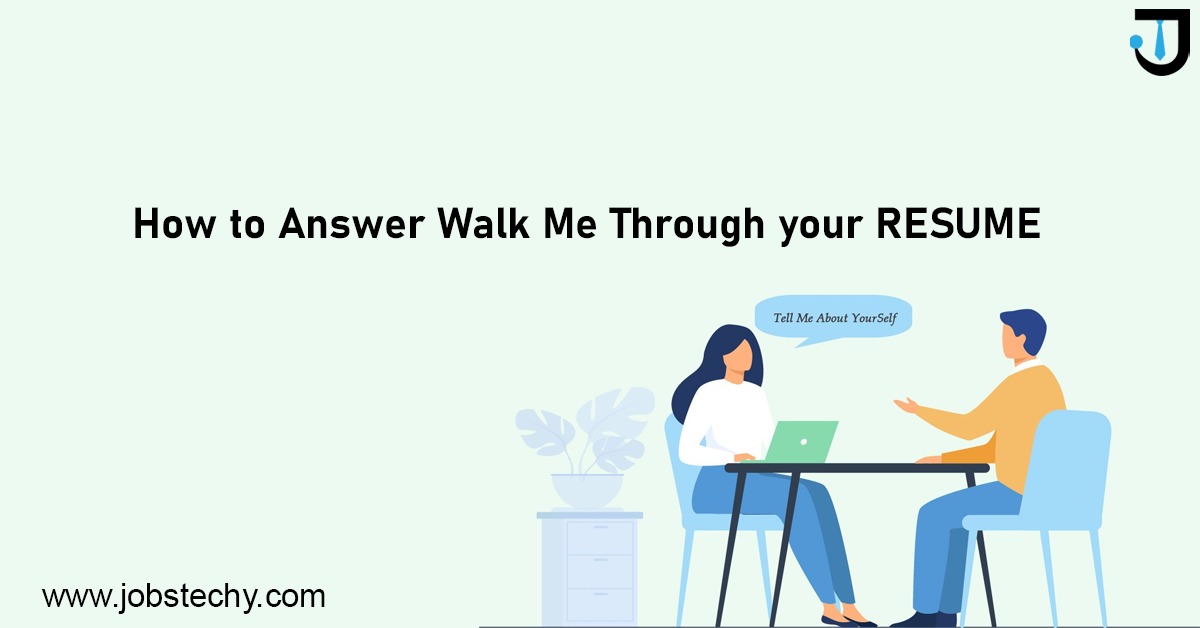
Interviewers ask you, “Walk me through your resume,” for many reasons. They want to test your skills and the way you communicate. This question is fundamental if you want to create a good impression. Some people just fail their interviews due to this first question.
If you want to know how to answer the “walk me through your resume” question, here are a few tips you must follow. Go through all of these carefully and note down your weak points.
Before diving into the tips, let’s know why the interviewer asks you this question.
You might wonder why this question holds this much importance. It’s essential to know why interviewees ask you this specific question.
They Check How You respond:
You're not exposed when you’re sitting silently, observing your interviewer. Right after this question, they start examining your body language and expressions. This is the time when you need to get yourself prepared. The interviewer checks how you take the question and communicate.
They Ask Because They’re Searching For the Fittest:
“The fittest survives”. This is true in this case, too. Your interviewer is assigned a job to observe each candidate keenly and shortlist the perfect ones. That’s where they have to meet the criteria, and they choose to question you in a tricky way. All they want is to have the best candidate join their company.
Are You the Same “Expert”:
The interviewer wants to know whether you can show your expert side the same way as mentioned in your resume. This question makes a lot of sense to realize you in person and is essential.
To answer this question, you need to prepare yourself beforehand. Don’t panic, and you’ll ace this question. Here are some exceptional tips to answer this question brilliantly:
Now, this might seem weird to you, but this works. Your tone must be confident. When asked a question, you are expected to answer critically.
To make sure you are confident, take time before starting to speak. This little action gives you a short preparation moment, which helps you craft the structure of your answer.
This never means you have to take more than a minute to start. Just don’t start immediately, as you may get stuck constructing your first few sentences.
This step gives you an edge. Knowing your resume and what expertise you have added lets you speak in front of the interview smartly.
On the other hand, if you need to remember what exactly you're sitting there for puts you in an awkward position.
Your interviewer isn’t there to hear your background stories or future ambitions. They're just judging you. It's always good to keep things concise and relevant. This saves you from telling them something you can’t justify that causes trouble later.
While answering the “Walk me through your resume “ question, always be realistic and be who you are.
Never give an impression of you as a perfectionist or all-rounder. Only talk about things you can handle and are expert at.
When sharing your resume story with an interviewer, think of it as telling the chapters of your professional journey rather than just listing the contents of a document. Goodfellow advises against simply reading off your resume because it misses the chance to connect with your interviewer.
Instead, turn each job role into a compelling story that intertwines with the skills or experiences crucial for your desired position.
For instance, you could vividly recount a time when a challenging problem at work honed your problem-solving skills, bringing to life the situation, your thought process, and the triumphant solution.
Or share a personal anecdote about how your dedication and hard work led to a swift promotion to assistant manager within just six months, illustrating your skill, passion, and drive.
Always try to tell your experiences properly. Whether you made a mistake or achieved something, mention it to sound human.
Mention your past and recent job experiences and let them know how you work and what you take regarding your field.
Answering them about your experiences should take you at most 3 minutes. Walk them through your work experiences in less time and be relevant.
Before the interview, tell yourself what exactly you will talk about there. Next, say loud to yourself and cut the fluff parts. Don’t memorize anything but practice the main points you want yourself to mention at the interview.
You can talk about it with your friend or an experienced person. Assume answering this question in an empty room and practice until you get perfect at presenting yourself.
Don’t mention your past and irrelevant experiences. Talk about only the recent and present jobs you’re doing.
Talk about your skills and working process. Mentioning your irrelevant past may frustrate your interviewer and also make it easier for you to cover up things in less time.
Be concise and talk about the real-time strategies you’re an expert in solving a problem. Don’t generalize your answer.
When an employer asks you to walk through your resume, think of it as sharing your professional story, starting from the roots – your educational beginnings or the dawn of your career journey.
Progress through your tale by touching on the important moments – those key career shifts, proud achievements, moments of growth through promotions, and any significant changes.
Conclude by painting a picture of where you stand now in your career and what dreams or goals you're reaching for next. This approach transforms a simple recounting of facts into a more personal and engaging narrative, showcasing not just your career timeline but the human journey behind it.